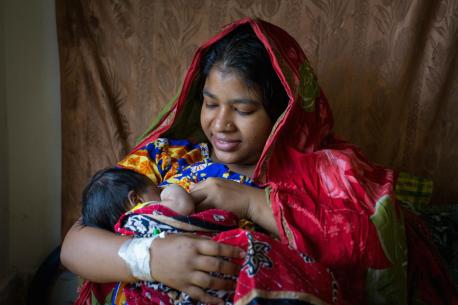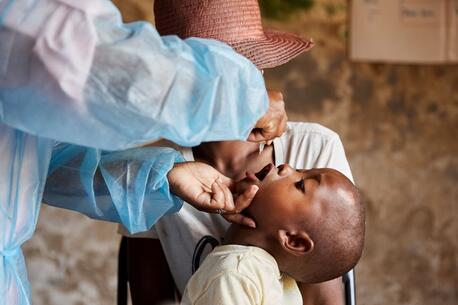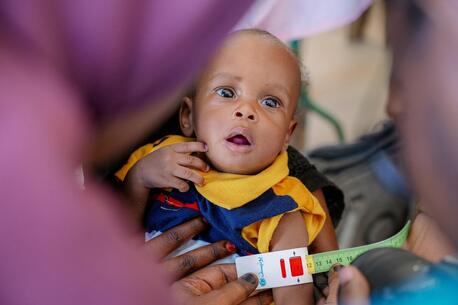
The Cost of Not Breastfeeding
On the heels of new evidence of the lifesaving benefits of early and exclusive breastfeeding, UNICEF calls for increased investment in workplace programs and other support for breastfeeding moms.
Breastfeeding saves lives — not just kids, but mothers too.
New research examining the human and economic costs of not breastfeeding found that hundreds of thousands of lives would be saved every year if there was universal adherence to the practice as recommended by UNICEF and the World Health Organization (WHO).

Parents of a newborn photographed at the maternity ward of a UNICEF-supported hospital in Yerevan, Armenia. Fathers, husbands and partners can play a critical role in supporting breastfeeding — a lifesaving practice that benefits both mother and child. © UNICEF/UN0206267/Pirozzi
Adequate breastfeeding, according to those recommendations, means initiating breastfeeding within an hour of birth and exclusively breastfeeding for at least the first six months. If every mother followed these guidelines for every child, according to researchers, nearly 100,000 mothers' and 600,000 children's lives would be saved annually, among other global health gains. Specifically:
- 98,243 fewer women would die of breast and ovarian cancers and type 2 diabetes every year
- 595,375 fewer children would die from diarrhea or pneumonia every year
- there would be close to 975,000 fewer annual cases of child obesity
Researchers also determined that inadequate breastfeeding results in $340 billion in avoidable health care costs and lost earnings worldwide every year. The team used a new Cost of Not Breastfeeding tool to arrive at these calculations. A July 24, 2019 journal article details the researchers' methodology and findings.

UNICEF staffer Cecilia Aldo visits with Anna Nyagma during a UNICEF-supported mother-to-mother support group meeting in South Sudan. Nyagma is not just a participant in these meetings — she actively encourages other women to attend, sharing information about nutrition and the benefits of exclusive breastfeeding babies for their first six months of life. UNICEF's efforts in this area, supported by community mobilizers like Nyagma, has helped South Sudan’s exclusive breastfeeding rate jump from 45 percent in 2010 to 74 percent in 2018. © UNICEF/UN0330995/Samie-Jacobs
The new data adds to an already compelling case for promoting and supporting the practice, an important part of UNICEF's mission to improve maternal and child health. UNICEF works with governments and other partners to advance family-friendly policies that are considered critical to increasing breastfeeding rates worldwide. These include guaranteed parental leave, quality chld care and the right to breastfeed in the workplace.
UNICEF also supports community-based and health facility-based efforts to provide information and support to breastfeeding mothers. Positive social norms that support and encourage breastfeeding, including in public spaces, help empower mothers to breastfeed. In communities, support from trained counsellors and peers, including other mothers and family members — especially men, husbands and partners — plays a key role. All of these considerations factor into UNICEF's strategy, working with partners to advance the practice worldwide.
A Global Breastfeeding Scorecard created by the UNICEF- and WHO-led Global Breastfeeding Collective — a partnership of 20 international agencies calling on donors, policy makers and civil society to increase investments in breastfeeding — reports progress on seven key policy actions and breastfeeding practices by country.

Mother Jyamima practices kangaroo care with her newborn twins at Gahini Hospital in Kayonza District, Rwanda, where health workers benefit from a UNICEF-supported mentorship program emphasizing early and exclusive breastfeeding and other guidance on newborn care. Early and exclusive breastfeeding is one of several low-cost, high-impact interventions that help children survive and thrive. © UNICEF/UN0321629/Kanobana
The Collective's goal is to boost global exclusive breastfeeding rates to at least 50 percent by 2025. Only 41 percent of babies were exclusively breastfed in the first six months of life in 2018, as recommended.
Other stats that illustrate the need to push forward on this issue:
- Worldwide, only 40 percent of women with newborns have even the most basic maternity benefits at their workplace. This disparity widens among countries in Africa, where only 15 percent of women with newborns have any benefits at all to support the continuation of breastfeeding.
- Only 12 percent of countries worldwide provide adequate paid maternity leave; women with six months or more maternity leave were at least 30 percent more likely to maintain any breastfeeding for at least the first six months.
- In 2018, less than half of babies worldwide — 43 percent — were breastfed within the first hour of life. Immediate skin-to skin contact and starting breastfeeding early keeps a baby warm, builds his or her immune system, promotes bonding, boosts a mother’s milk supply and increases the chances that she will be able to continue exclusive breastfeeding.
“The health, social and economic benefits of breastfeeding — for mother and child — are well-established and accepted throughout the world," UNICEF Executive Director Henrietta Fore points out. "Yet, nearly 60 percent of the world’s infants are missing out. Workplaces worldwide are denying mothers much needed support. We need to have far greater investment in paid parental leave and breastfeeding support across all workplaces to increase breastfeeding rates globally.”
For World Breastfeeding Week, Aug. 1-7, help UNICEF continue its lifesaving work, supporting and promoting early and exclusive breastfeeding. Every donation counts. To learn more, visit unicef.org/breastfeeding — and join the conversation! #WBW2019 #EarlyMomentsMatter
Top photo: Ruma Akhtar breastfeeds her newborn baby at the Patuakhali District Hospital maternity ward in Bangladesh on April 12, 2018. UNICEF works to support national governments in making the world a friendlier place for all mothers who wish to breastfeed. Breastfeeding is known to prevent infant death, childhood illness and non-communicable diseases, while supporting brain development and protecting maternal health. © UNICEF/UN0233428/Mawa
HOW TO HELP
There are many ways to make a difference
War, famine, poverty, natural disasters — threats to the world's children keep coming. But UNICEF won't stop working to keep children healthy and safe.
UNICEF works in over 190 countries and territories — more places than any other children's organization. UNICEF has the world's largest humanitarian warehouse and, when disaster strikes, can get supplies almost anywhere within 72 hours. Constantly innovating, always advocating for a better world for children, UNICEF works to ensure that every child can grow up healthy, educated, protected and respected.
Would you like to help give all children the opportunity to reach their full potential? There are many ways to get involved.





